Water: Why Offering Water to Early Eaters Can be Dangerous
- Why your baby is already getting all the water they need from infant milk…that's breastmilk and/or commercial infant formula
- Three reasons why you should WAIT to introduce water from an open cup until your baby is closer to their first birthday
- What your baby SHOULD be drinking if water isn't safe early on…and when it IS safe to start water, how do you do it?
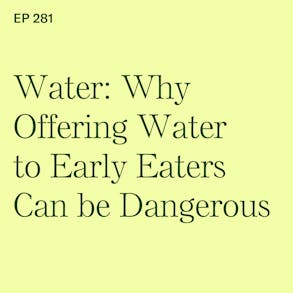
LISTEN TO THIS EPISODE
Episode Description
When should I offer my baby water out of the open cup? How much water do babies need? Does my baby even NEED any additional water? In this episode we’re looking at the reasons why you might want to WAIT when it comes to offering your infant water.
Links from This Episode
- Baby-Led Weaning with Katie Ferraro program with the 100 First Foods™ Daily Meal Plan, join here: https://babyledweaning.co/program
- Baby-Led Weaning for Beginners free online workshop with 100 First Foods™ list to all attendees, register here: https://babyledweaning.co/baby-led-weaning-for-beginners
Other Episodes Related to this Topic
Here are some other BLW podcasts about open cup drinking, picking milk for your baby, cow’s milk and milk alternatives:
- Episode 113 - Transitioning to Cow's Milk: How Do I Do This? https://blwpodcast.com/episodes/113
- Episode 79 - How to Pick a Milk When Your Baby Turns 1 https://blwpodcast.com/episodes/79
- Episode 135 - Toddler Milks: Why You Don't Need to Buy These Formulas https://blwpodcast.com/episodes/135
- Episode 101 - Straw Cup vs. Open Cups: Which Comes First? with Dawn Winkelmann, MS, CCC-SLP https://blwpodcast.com/episodes/101
- Episode 60 - 6 Reasons to Skip the Sippy Cup with Dawn Winkelmann, MS, CCC-SLP https://blwpodcast.com/episodes/60

Latest Episodes
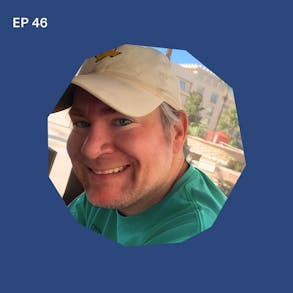
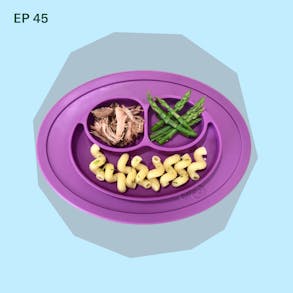
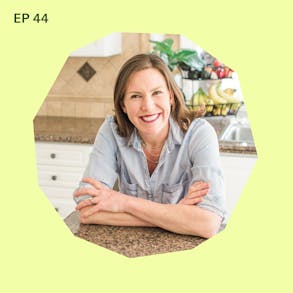
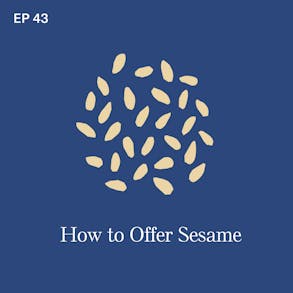
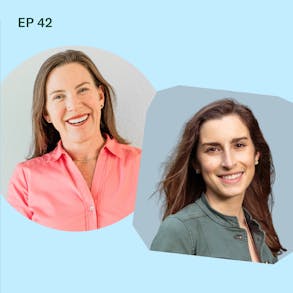
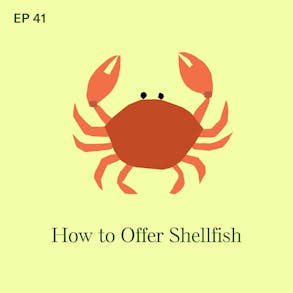
Katie Ferraro (1s):
So while I do agree with AAP that yes, we can begin to help Babies learn to drink out of an open Cup at six months of age. I disagree that we start with water. Water is a thin liquid. It takes up valuable room in your baby's stomach, and there's absolutely no evidence that infants need any free water. Hey there. I'm Katie Ferraro, Registered Dietitian, College nutrition professor and mom of seven specializing in baby-led weaning. Here on the Baby-Led Weaning Made Easy podcast, I help you strip out all of the noise and nonsense about feeding, leaving you with the confidence and knowledge you need to give your baby a safe start to solid foods using baby-led weaning.
Katie Ferraro (41s):
Hey guys, and welcome back. Today we're talking all about water and water needs for your Babies and in particular, why offering too much water, especially to early Eaters can be dangerous. So I like to start out each of these Mini baby-led weaning training episodes with a BLW tip of the day. Today's tip on water is that your baby does not need any extra water or any free water. Okay? Babies get most of their hydration needs from infant Milk. That's the breast Milk or the formula that your baby is drinking, plus the new Foods that your baby is learning how to eat. Now, there are a few times when Babies can benefit from extra water, and I'll be telling you when your baby might actually need some extra water a little bit later in this episode.
Katie Ferraro (1m 24s):
I know as a parent, I'm concerned about my own hydration. I definitely don't drink enough water. Anyone who works with me or lives with me can attest to that. And I remember when my Babies were little, I always thought, Well, I need more water. And they need more water too. And what you're gonna learn in today's Mini episode here is that Babies get most of the water that they need from the infant Milk. All right? And prior to six months of age, we don't need to give any free water for Babies. Now, the American Academy of Pediatrics recommends starting to introduce water at six months of age, but as with a lot of their infant nutrition recommendations, I have a differing opinion because a lot of their recommendations are not always based on science. It's more of a practice. They're definitely benefits to learning how to drink out of an open Cup.
Katie Ferraro (2m 4s):
But today I wanna share why I do not recommend water for earlier Eaters. Now, let's start out with how much water does your baby need, right? Breast Milk is what is designed to meet the entirety of your baby's nutrition and hydration needs from zero to six months of age. And what's cool about breast Milk is that it's biologically designed such that your baby doesn't need any water or any other fluids, even if it's hot weather. Okay? And then formula of course, which tries to replicate breast Milk when it is prepared properly. Commercial infant formula also meets your baby's hydration needs. And just a note that you should never over dilute infant formula by adding extra water if you're concerned about dehydration, because that can severely impact your child's nutrition status.
Katie Ferraro (2m 45s):
So as far as dietary recommendations go, there is an adequate intake value set for water, okay? And that's part of the dietary reference intakes and the adequate intake values, though we always take them with a grain of salt, they are not based on solid science as we see with the RDA recommended dietary allowance values. So sometimes parents will say, Oh, but I read the DRI charts. And I saw that the AI for water for six to 12 month old Babies is 0.8 liters. Okay? But I do wanna point out when there's not enough scientific evidence to set a recommended dietary allowance, the DRI committee defaults to providing what's called an adequate intake value. And it's kind of like a scientific shot in the dark. Here's how much we think your baby needs.
Katie Ferraro (3m 25s):
And what that's calculated on is the notion that between six and 12 months of age, yeah, you're starting solid foods. And those starting solid foods, those foods provide some water. The reality is that your baby is still getting most of their nutrition or a lot of their nutrition from breast Milk or formula. So the water is coming from there. And that AI value, in case you're interested, it's 0.8 liters. So infant six to 12 months of age "need" with a huge asterisk because again, this is not based on solid scientific evidence, 800 milliliters, which that's about 27 ounces or three and a half Cups of water. So some of these parents will see them like, Oh my gosh, I need to make my baby drink three and a half Cups of water. No, you do not. Your baby is getting that fluid needs the fluid intake from the foods plus the infant Milk.
Katie Ferraro (4m 10s):
Now what the AAP says is, and this is quoting, around six months of age, you can start offering your baby a little bit of water and then the open parentheses four to eight ounces a day or half to one Cup a day in an open, comma, Sippy or Straw Cup. And this is Katie chiming back in the fact that the AAP is still recommending Sippy Cups as a way for you to transition your baby off of the bottle of the breast is ludicrous. And it is indicative of I think, the vast amount of work that pediatricians need to be doing as far as educating themselves about best practices and evidenced based practices for infant nutrition. Back to the AAP quote, they say, quote, "this helps develop Cup drinking skills and familiarity with water. If you live in an area where the water is fluoridated, drinking water will also help prevent future tooth decay."
Katie Ferraro (4m 53s):
So a couple of notes here. We don't recommend Sippy Cups if this is news to you. Dietitians, speech language pathologists, occupational therapists who specialize in feeding, we all know the drawbacks of Sippy Cup usage. If this is news to you, go check out another episode that I did, episode 40, It's called "Six Reasons to Skip the Sippy Cup." I interviewed Dawn Winkelmann, who is also a baby-led weaning expert. She is a speech language pathologist. We kind of walk through the drawbacks of Sippy Cups. Hey, we're gonna take a quick break, but I'll be right back.
Art of History Amanda Matta (5m 28s):
Behind every work of art, there's a story. Okay, sure, it sounds kind of obvious when I say it like that, but think about it. How many times have you stood in an art museum, maybe with a date or with your mom, looked at an artwork and thought, I don't get it. I'm Amanda, and I know the feeling all too well. To me, knowing the story behind an artwork is a huge part of knowing how to look at it and appreciate it. And on my podcast Art of History, that's exactly what I share with you. In each episode, we view history through the lens of some really great works of art. There is so much we can learn about the people and things, which someone way back when deemed worthy of recording for posterity. And let me tell you on the podcast, we have barely scratched the surface. Join me as we dive deep into the bigger picture behind some familiar and maybe not so familiar works of art, no prerequisites required. Check out art of history wherever you get your Podcasts.
Katie Ferraro (6m 33s):
But AAP telling you that this helps your baby develop Cup drinking skills. So does drinking formula or breast Milk out of an open Cup and then quote unquote familiarity with water. Your child will develop familiarity with water when the time is right, which is when they can respond to their own feelings of thirst by asking for or getting water as a Toddler. Okay? But in older infancy, right? Six to 12 months of age, if we look at the earliest part of starting solid FOODS six and seven months of age, why do I not recommend water? Okay, And other feeding experts recommend refraining from introducing water at six and seven, sometimes even eight or nine months of age. A couple of reasons. Let's start with the speech language pathologist angle. Okay? SLPs will remind us that water is a thin liquid.
Katie Ferraro (7m 15s):
Thin liquids are more challenging for your baby to learn how to drink, right? Your baby is only used to having thicker liquids like breast Milk or formula. And so you can see excessive gagging when Babies, early Eaters at five and six and seven months of age are trying to learn to drink water. And a little bit of gagging, as you know is to be expected. But we don't want to make your baby unnecessarily gag by providing this thin liquid that they are not yet ready to drink. Because of course there is the risk of aspiration, but also excessive gagging can lead the baby to start having negative associations with food and feeding. Another reason why we don't want to be pushing water on early Eaters is the potential too to plea electrolytes, right? You've probably heard of over hydration, okay? It happens not very rarely, okay?
Katie Ferraro (7m 55s):
You're much more likely to be dehydrated than you are to be over hydrated. But there's certainly case studies, especially with athletes, a lot of times you hear about this in like fraternity and sorority hazing situations where the individual will be forced to drink a lot of water causing their electrolyte levels to drop, right? So those valuable salts, sodium, potassium, the electrolytes among others that are integral to sustaining your baby's heart function and their life, we don't want to potentially have these drop too low because we're diluting those in the baby's body. So we don't mess around with water by overdoing it because we know your baby doesn't need that extra water. My concern as a Dietitian with regards to pushing Babies to drink water too early is that it can cause your baby to feel artificially full.
Katie Ferraro (8m 38s):
Okay? So back when I was a weight loss Dietitian in private practice over 20 years ago, and I'd be working with patients who, you know, look in different ways to lose weight, and I worked in a cardiology setting and I also have a diabetes background and I'm a certified diabetes educator, we would talk about, you know, some of these typical like diet tricks, right? Like when you think you're hungry, it's really just your body telling you that you're thirsty and you should drink a big glass of water. And then you wait 10 minutes and then you ask yourself again, am I really hungry or was I just thirsty? And it is true that the hypothalamus, the part of your brain that controls both your hunger also controls your thirst. However, what happens when we drink water is that that water takes a room in the stomach, the stomach starts to descend, that distension of the abdomen starts to send messages that go to the brain and tell your brain, Hey, I'm starting to get full and I should slow down or stop eating.
Katie Ferraro (9m 24s):
Now when our Babies start solid foods at six and seven months of age, of course they don't know yet how to respond to feelings of hunger with food. But what we do not want to do is to fill their tiny little stomachs up with water, sending out those false messages to the brain. Hey baby, you're hungry. Stop eating, right? We don't want to interfere with that feedback loop at the very time when we actually want our Babies to be learning a. how to eat. And then eventually down the road a few months later, that's when they'll start being able to respond to those hunger and fullness cues by using food. And they'll also, you'll be amazed, drink more when they're thirsty and drink less when they're not thirsty. So three reasons why we don't wanna offer water to early Eaters is a thin liquid, which can cause excessive gagging and increased risk of aspiration.
Katie Ferraro (10m 8s):
Number two, it has a potential to deplete electrolytes, those valuable sodium, potassium, et cetera, which help you know, maintain your baby's heart and their life. And then third, we don't want to make your baby feel artificially full by promoting extra water. So it's one less thing for you guys to worry about. Now, what else should Babies not drink? We don't want Babies drinking any juice. One thing I do agree with the American Academy pediatrics on is their recommendation for no juice at all at under 12 months. It took them forever to finally come out and say what dietitians have been saying forever. There's absolutely no need for your baby to drink juice. We want your baby to eat fruit, not drink it. Baby should also avoid drinking herbal tea. And then we don't do any fluid cow's Milk or Milk alternatives in place of infant Milk, so in place of breast Milk or formula until after 12 months of age.
Katie Ferraro (10m 51s):
Hey, we're gonna take a quick break, but I'll be right back.
All Creatures Podcast (10m 59s):
So Angie and I do the All Creatures podcast. And so Angie, do you have a favorite moment of doing this the last few years? Oh yes, Chris, I remember early on covering Poison dart frogs and learning that the dad's piggyback the tadpoles to a water source. For me was the honey badger. The fact that they can take a Cobra snake bite and just sleep it off like it's no big deal, it just blew me away. Oh, when I developed such a conservation crush, when I interviewed Chris Fisher from Oser, he's such a rockstar in the conservation world, pulling those great whites up out of the ocean to do research on them and then putting them back in so we can learn about where they live and where they breed. Incredible. Each week Angie and I explore and, and we share these details about these animals that you probably don't even know exists. And both Chris and I are PhD scientists and educators and we do the deep dives of the scientific research and bring it back to you in a fun and educational way. Yes, we do. And you can find the All Creatures podcast wherever you get your Podcasts.
Katie Ferraro (12m 3s):
So what should your baby be drinking? Your baby should be drinking breast Milk, and/or formula. And then how should your baby learn how to drink? Hey, I know your baby knows how to drink. They can drink out of a breast or they can drink out of a bottle. Once you hit that six month mark, that's when you start bringing in complimentary foods. My focus is always on the food at the mealtime. I know baby knows how to drink infant Milk. I want to help baby learn how to eat solid foods so that by the time the baby is 12 months of age, they'll be getting most of their nutrition from food and only a small amount of their nutrition from fluids, be that infant Milk if you continue to breastfeed past 12 months of age, or cow's Milk, which we switched to when the baby turns 12 months of age. So how should your baby learn how to drink? Well, I do agree with AAP that you should start practicing drinking out of an open Cup.
Katie Ferraro (12m 46s):
Open Cup comes before Straw Cup. If this is news to you, there's another episode I want you to go listen to, Episode 101. It's called "Straw Cups versus Open Cups: Which Comes First." And again, that's another interview with Speech Language pathologist with Dawn Winkelmann. She's actually the designer for the Ezpz Tiny Cup. So this is an award-winning open Cup for baby-led weaning. It's a two ounce Cup designed for baby six to 12 months of age. This is my absolute favorite Cup for practicing open Cup drinking. And we start with breast Milk and/or formula in the open Cup. I do water for older Eaters. So once The baby is around nine, 10 months of age, I'm really comfortable with their ability to eat a variety of different textures and to handle different thicknesses of liquids.
Katie Ferraro (13m 29s):
Then I'll move to a little bit of water if necessary. Now, parents hate this idea cuz they're like, Yeah, but I put a little bit of the breast Milk or formula in the two ounce Cup and The baby tips it over and then I'm wasting expensive formula or valuable breast Milk. And I get it, it feels better to start with water, but it's not the best option for your baby. And you can help your baby learn how to drink from an open Cup by cupping your hands outside of your baby's hands as your baby holds the Cup and gently help guide the Cup to your baby's mouth. So I recommend Open Cup drinking starting at six months of age. So I use the Ezpz tiny Cup six to 12 months of age as The Baby gets close to the one year mark if I need a Straw Cup. But a lot of times I Skip the Straw Cup, I use the Ezpz Mini Straw Cup system and then at 12 months of age I switch to the Mini Cup.
Katie Ferraro (14m 11s):
So I'll link all this up on the show notes page for this episode, showing you the different sizes of the Cups and what I put in it for the different ages and stages. That'll be on the show notes page for this episode at blwpodcast.com. If you guys are interested in getting some of those Open Cups, I am an affiliate for Ezpz. So I have a 10% off discount code, katie10 works for all of the feeding gear products at ezpzfun.com. Again, the tiny Cup is the first one to start with, then get their Mini Cup and Straw system and it's perfect cuz when your baby hits 12 months of age, you already own the Mini Cup, which is the four ounce Cup that we're gonna bump it up to. A couple of other podcast episodes if you want to listen to about drinking stuff, I mentioned episode 101 that was Straw Cups versus Open Cups.
Katie Ferraro (14m 52s):
Episode 113 is all about Transitioning to cow's Milk, How Do I Do This. So that's for those of you guys who may be approaching the 12 month mark. Episode 79 is about How to Pick a Milk When Your Baby Turns one. We talk a little bit more about plant Milks and other Milk alternatives if you're deciding, because either your child has cow's Milk protein allergy or you're vegan that you're not gonna do Cow's Milk. Episode 135 is about Toddler Milks and why you do not need to be buying these Formulas. And then episode 60 again was the Six Reasons to Skip the Sippy Cup with Dawn Winkelmann. All right, well, I love little chat about water, links for you guys are gonna be on the show notes for this page at blwpodcast.com/281. Thank you for listening and thank you also to our network partners at AirWave Media. If you like Podcasts that feature science, food, and using your brain, check out AirWave Media for some other amazing audio experiences.
Katie Ferraro (15m 40s):
My home base again for this podcast is blwpodcast.com and I'll see you next time. Happy Feeding.

The Program Baby-Led Weaning with Katie Ferraro
A step-by-step digital program for starting solid foods safely and navigating the original 100 FIRST FOODS™ meal plan with baby-led weaning.
 EXPERT-LED, PROVEN APPROACH TO EATING REAL FOOD
EXPERT-LED, PROVEN APPROACH TO EATING REAL FOOD CONCISE VIDEO TRAININGS TO MASTER BABY-LED WEANING
CONCISE VIDEO TRAININGS TO MASTER BABY-LED WEANING 100 FIRST FOODS DAILY MEAL PLAN WITH FOOD PREP VIDEOS
100 FIRST FOODS DAILY MEAL PLAN WITH FOOD PREP VIDEOS
Baby-Led Weaning for Beginners Free Workshop
Is your baby ready to start solid foods, but you’re not sure where to start? Get ready to give your baby a solid foundation to a lifetime of loving real food…even if you’re feeling overwhelmed or confused about this next stage of infant feeding.
Get baby-led weaning recipes and tips delivered to your email inbox.

